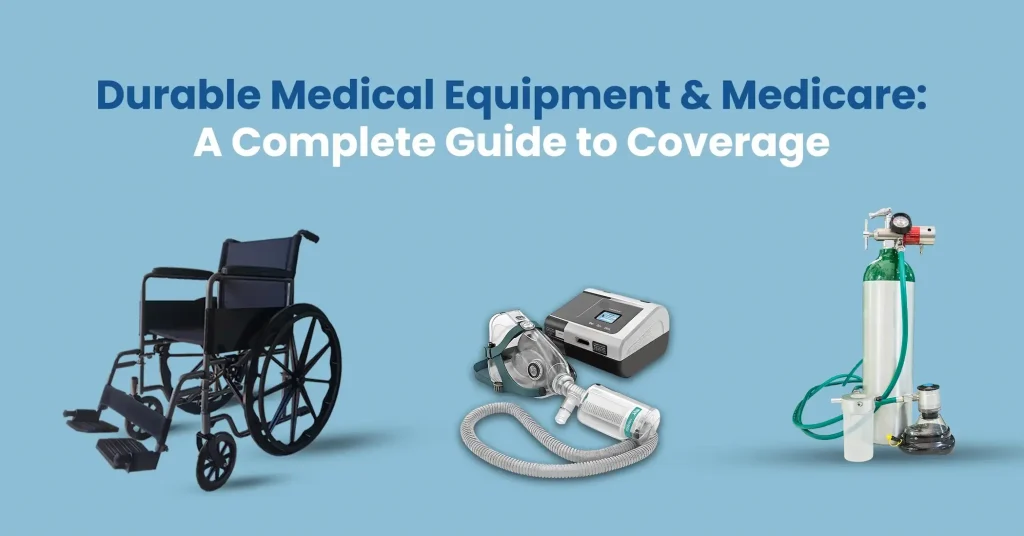Your way to Independence and Safety:
Navigating healthcare is such a difficult task. Understanding your medical benefits is necessary. If you or a loved one needs medical equipment to live safely at home, you are in the right place. This guide explains everything about Durable Medical Equipment, or DME. We will cover how Medicare can benefit you in getting the tools you need. Our goal is to facilitate you. Because we believe that health must be first priority.
What is Durable Medical Equipment (DME)?
Let’s begin with a basic approach. Durable Medical Equipment, DME, is medical equipment used at home. It helps you manage a health condition or injury. This equipment is built to last. It can withstand repeated use. Doctors prescribe these items for medical reasons.
Examples include:
- Wheelchairs & scooters
- Walkers and canes
- Hospital beds
- Oxygen tanks and accessories
- CPAP machines for sleep apnea
- Blood sugar monitors
- Nebulizers
For Medicare to cover it, DME must:
Serve a clear medical purpose.
Be safe and practical for home use.
Have lasting durability (usually three years or more).
How Medicare Covers DME
Medicare Part B is the section that pays for most DME equipment. Here’s what you need to know:
- Your doctor must confirm the equipment is medically necessary.
- You must use a Medicare-approved DME supplier.
- After you meet your Part B deductible, Medicare pays 80% of approved costs. You cover the remaining 20% coinsurance.
| ItemS | Covered by Medicare? | What You Pay | NOTES |
|---|---|---|---|
| Wheelchairs | ✅ Yes | 20% coinsurance | Requires doctor’s prescription |
| Hospital Beds | ✅ Yes | 20% coinsurance | May rent or buy |
| CPAP Machines | ✅ Yes | 20% coinsurance | Must show medical need |
| Oxygen Systems | ✅ Yes | 20% coinsurance | Coverage depends on condition |
| Hearing Aids | ❌ No | 100% | Not covered by Medicare |
There’s a difference between a DME provider and a DME supplier.
A DME provider sells or rents medical equipment to patients.
A DME supplier is approved by Medicare and allowed to bill for it.
When searching for Medicare DME providers, always confirm approval. If your supplier is not in the Medicare program, your claim won’t be paid.
You can use Medicare’s online directory to find a DME supplier near you.
How DME Connects with Home Healthcare
People who need DME often also receive home healthcare. This care includes skilled nursing, physical therapy, and help from a home health aide agency.
Role of Home Health Aide Services
- Helping patients safely use equipment. Equipment like walkers or hospital beds
- Monitoring devices just like oxygen tanks and CPAP machines
- Supporting independence and reducing hospital visits

How Agencies Work with Suppliers
A home health aide agency may coordinate with a DME medical supplier to:
Place orders based on a doctor’s prescription
Arrange delivery and setup
Teach patients and families how to use the equipment
This teamwork makes care at home smoother and safer.
Steps to Get Durable Medical Equipment Through Medicare:
Whole process:
- Doctor visit – Your doctor evaluates your medical needs.
- Prescription – You receive a written order for the equipment.
- Choose a supplier – Pick a Medicare-approved DME supplier.
- Authorization – Some items, like power wheelchairs, need prior approval.
- Delivery and training – The supplier delivers equipment. And may show you how to use it.
- Billing – Medicare pays 80%. And you pay the rest 20%.
Challenges with Durable Medical Equipment Coverage:
Even with Medicare, getting the right equipment isn’t always simple. Common problems include:
Getting the right equipment is a bit challenging. Approval for high-cost items takes extra time. Medicare requires more paperwork for expensive devices. This can mean long delays when you need help now. Some very useful items are simply not covered. Medicare often denies payment for stair lifts or grab bars. These are seen as home modifications, not medical equipment. Air purifiers are also typically excluded. Even when something is covered, the costs can surprise you. You are responsible for 20% of the Medicare-approved cost. For a expensive power wheelchair, that 20% is a large amount. This coinsurance fee can create a real financial strain. Always confirm your coverage before you order any equipment. Ask your DME supplier if renting is an option instead of buying. This can lower your initial costs. Some Medicare Advantage plans also offer better DME benefits. Being prepared is your best strategy for success.
Conclusion: Empowering Your Health Journey.
Knowing about DME and Medicare is essential. It enables you to control your health. You deserve to live safely and independently. With the relevant equipment, you can live quality life. Also you deserve to live like a normal human.
Remember these key points:
- Always get a prescription from doctor.
- Go for a Medicare-approved DME supplier.
- Know your costs before ordering equipment.
FAQ’s
1. Does in-home care comes in medicare?
Yes. Medicare covers some in-home care services. Only if they are medically necessary. This can include part-time home health aide services. Also nursing and therapy.
2. Who qualifies for home health care services?
You qualify if you:
Are under a doctor’s care
Need skilled nursing or therapy
Are homebound
Are using Medicare-certified home healthcare agency
3. How to qualify for home health care under Medicare?
Your doctor must certify your need for skilled care. You must also be homebound and use a Medicare-approved home health aide agency.
4. What is a DME provider?
A DME provider is a company that supplies or rents durable medical equipment.
5. What is DME in healthcare?
In healthcare, DME means Durable Medical Equipment. It includes wheelchairs and some medical devices.
6. DME supplier near me – how do I find one?
Use Medicare’s official supplier directory to locate a DME supplier near you that accepts Medicare.
7. What is DME in medical term?
In medical terms, DME means Durable Medical Equipment, prescribed for long-term home use.
8. DME meaning – what does it stand for?
DME meaning: Durable Medical Equipment. These are reusable devices prescribed for home care.
9. What is DME?
DME stands for Durable Medical Equipment. It supports elders and patients for long-term living and support.

